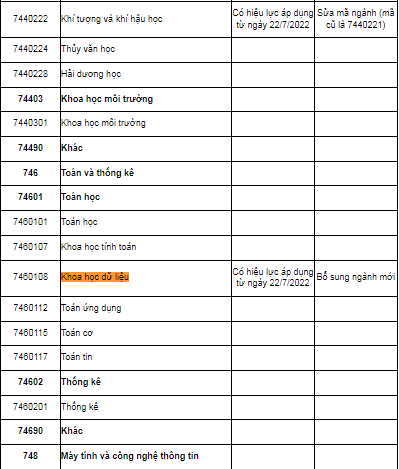Vietnam: How is the field of Data Science understood?
Vietnam: How is the field of Data Science understood?
Data science is the science of exploring, managing, and analyzing data to predict future trends and make decisions and strategic actions.
Data science consists of three main parts: data creation and management, data analysis, and applying analysis results into valuable actions.
The analysis and use of data rely on three sources of knowledge: mathematics (Mathematical Statistics), information technology (Machine Learning), and knowledge of specific application fields.
Necessary skill sets for a data scientist include Analytics, Programming, and Domain Knowledge.
There are several specialized subjects such as:
Applied Statistics
Introduction to Computer Science
Programming with Python, R, or SQL
Data Visualization
Probability
Data Mining
Note: The content is for reference only!
Additionally, Data Science is one of the new fields according to Appendix 1 List of Higher Education Training Disciplines issued together with Circular 09/2022/TT-BGDDT as follows:

>>> Download the full list of higher education training disciplines.

How is Data Science understood? (Image from the Internet)
Can member universities of a regional parent university independently establish data science programs in Vietnam?
Based on Clause 2 Article 11 of the Regulation on the organization and operation of regional universities and their member - higher education institutions issued together with Circular 10/2020/TT-BGDDT:
Establishing training programs and cooperating in training with foreign institutions
…
2. member universities of a regional parent university exercise their autonomy to decide on the establishment of training programs and cooperation in training with foreign institutions at undergraduate, master’s, and doctoral levels as stipulated in point e Clause 1 Article 13 of Decree 99/2019/ND-CP and in accordance with the strategy, development plan, and annual plan of the regional university.
Referencing point e Clause 1 Article 13 of Decree 99/2019/ND-CP:
Autonomy rights and accountability of higher education institutions
Higher education institutions exercise autonomy rights and accountability in accordance with the Law on Higher Education, as amended and supplemented, and the following regulations:
1. Academic and professional autonomy rights
…
e) If the conditions for exercising autonomy are met as stipulated in Clause 17, autonomy is granted for establishing training programs as stipulated in Clause 18, and for foreign cooperation in training as stipulated in Clause 30, Article 1 of the Law amending and supplementing several articles of the Law on Higher Education;
... Member universities of universities are granted autonomy to decide on the establishment of training programs and cooperation in training with foreign institutions when the conditions for establishing programs are met as stipulated in Clause 3 Article 33 and the conditions for foreign cooperation in training are met as stipulated in Clause 5 Article 45 of the Law on Higher Education (as amended and supplemented), in accordance with the regulations on the organization and operation of the university.
Higher education institutions that do not meet the conditions stipulated in Clause 17 Article 1 of the Law amending and supplementing several articles of the Law on Higher Education shall establish training programs and cooperate in training with foreign institutions as stipulated by law.
Thus, member universities of a regional parent university will be granted autonomy to decide on the establishment of undergraduate Data Science programs when the conditions for establishing programs are met as stipulated in Clause 3 Article 33 of the Law on Higher Education 2012 (amended by Clause 18 Article 1 of the Law amending and supplementing the Law on Higher Education 2018).
Member universities of universities are granted autonomy to establish undergraduate programs when the following conditions are met:
- Conditions for establishing undergraduate programs stipulated in Clauses 1 and 2 Article 33 of the Law on Higher Education 2012 (amended by Clause 18 Article 1 of the Law amending and supplementing the Law on Higher Education 2018);
- Conditions for exercising autonomy of member universities stipulated in Clause 2 Article 32 of the Law on Higher Education 2012 (amended by Clause 17 Article 1 of the Law amending and supplementing the Law on Higher Education 2018).
What are the general conditions for universities to establish training programs in Vietnam?
Based on Article 3 of Circular 02/2022/TT-BGDDT, the training institutions, which are universities, must meet the general conditions when establishing undergraduate, master’s, or doctoral training programs, including:
(1) Meet the requirements for the proposed training field and training level.
(2) Meet the requirements for teaching staff.
(3) Meet the requirements for infrastructure.
(4) The proposed training program must be developed, assessed, and issued in accordance with the regulations of the Ministry of Education and Training, meeting the program standards of the field, group of fields, or training discipline, and conform to the Vietnamese National Qualifications Framework.
(5) The training institution has a specialized unit at the faculty level or equivalent to manage professional activities, lecturers, students, and other management tasks related to the proposed training field.
(6) The training institution must meet the minimum requirements and conditions as per the current regulations of the Ministry of Education and Training to be ready for online teaching that assures training quality as stipulated.
(7) The university council has passed a resolution approving the policy to open the training field of the training institution.
In the case where the training institution does not have a university council, there must be an official document approving the policy to open the training field from the direct management authority of the training institution.

